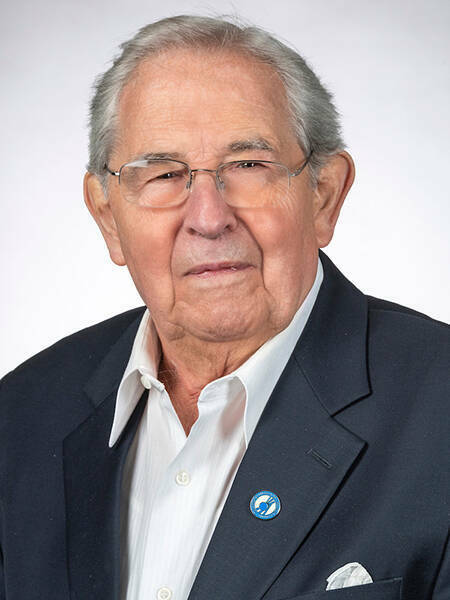In memoriam: Winfried ‘Fred’ Dallmayr, professor emeritus of political science

Winfried “Fred” Dallmayr, professor emeritus of political science at the University of Notre Dame, died June 5. He was 95.
A native of Germany, Dallmayr experienced a tumultuous childhood during World War II that impacted him greatly and shaped his trajectory as a political theorist and philosopher. His research focused on modern and contemporary European thought, with an interest in comparative or cross-cultural philosophy.
“He fervently believed that political theorists should not limit themselves to Western ideas, but they should be open to global political philosophy and theory,” said A. James McAdams, the William M. Scholl Professor of International Affairs. “He was also a proponent of the idea that morality should not be left up to the individual to determine but rather should grow out of the meaningful interactions of fellow human beings. In this sense, especially given the emphasis that he put on spirituality, Fred was a true Notre Dame intellectual.”
While a part of Notre Dame’s Department of Political Science, Dallmayr was a recipient of a National Endowment for the Humanities fellowship in 1978 and a Fulbright Research Grant in India in 1991. He retired in 2004 as the Packey J. Dee Professor of Political Science.
He authored 40 academic books, averaging a production of one book a year, many of which were translated into varying languages. He also co-wrote and edited books until he was 94.
A sampling of his recent publications include “Contemporary Chinese Political Thought: Debates and Perspectives” (2012), “Return to Nature?: An Ecological Counterhistory” (2011), “Integral Pluralism: Beyond Culture Wars” (2010), “Comparative Political Theory: An Introduction” (2010), “Civilizational Dialogue and Political Thought: Tehran Papers” (2007) and “In Search of the Good Life: A Pedagogy for Troubled Times” (2007).
“He was extraordinary in that sense, and they were high-quality books based on first-rate scholarship, and his works were recognized as such by people around the world,” said McAdams, who noted he saw Dallmayr give a book presentation only four weeks before his death. “Until the very end, he was the consummate intellectual.”
Dallmayr began his academic career in Germany and Italy. After immigrating to the United States in 1955, he received a doctorate in political science from Duke University in 1960 and taught at Purdue University until he joined the Notre Dame faculty in 1978, holding a joint appointment in the Department of Philosophy.
He also served as the president of the Society for Asian and Comparative Philosophy, an advisory member of the scientific committee of Reset Dialogues on Civilizations (Reset DOC) in Rome, the executive co-chair of World Public Forum Dialogue of Civilizations (WPF-DOC) in Vienna, and was a member of the supervisory board of the Dialogue of Civilizations Research Institute in Berlin.
Dallmayr is survived by his wife, Ilse Dallmayr; two children, Dominique and Philip; and two grandchildren, Keegan and Josefina.
Originally published by at al.nd.edu on June 12.
Latest Faculty & Staff
- Faculty receive prestigious early career awards from National Science FoundationDuring the 2024-25 academic year, four researchers in the University of Notre Dame’s Colleges of Engineering and Science received early-career awards from the National Science Foundation.
- In new research, Roy Scranton explores climate change and the limits of human progressIn his most recent book, “Impasse: Climate Change and the Limits of Progress,” Scranton, an associate professor of English, defines the impasse he sees as “not only political and institutional, but cognitive, existential and narrative” and asserts that the only path forward is through embracing what he terms ethical pessimism. “A lot of people confuse pessimism with nihilism, apathy and despair,” Scranton said. “But pessimism is actually about recognizing our limits, letting go of unrealistic goals, finding solidarity in the fact of human suffering and doing what you can now, not in some utopian future.
- Joule Bergerson, energy technology assessment expert, named new director of ND EnergyND Energy faculty director Joule…
- In memoriam: Alasdair MacIntyre, the Rev. John A. O’Brien senior research professor of philosophy emeritusAlasdair MacIntyre, the Rev. John A. O’Brien senior research professor of philosophy emeritus and a permanent senior distinguished research fellow at the de Nicola Center for Ethics and Culture, died on May 21, 2025. He was 96.
- Santiago Schnell, dean of Notre Dame’s College of Science, appointed as provost of DartmouthSantiago Schnell, the William K. Warren Foundation Dean of the College of Science at the University of Notre Dame, has accepted an appointment as provost at Dartmouth College. He will depart Notre Dame at the end of June and begin his new role in July.
- Notre Dame’s Fightin’ Irish Battalion receives Department of Defense award as nation’s top Army ROTC programThe United States Department of Defense honored the University of Notre Dame’s Army ROTC Fightin’ Irish Battalion as the nation’s top Army collegiate program for the 2023-24 academic year. This will be the first time the unit has received the department’s Educational Institution Partnership Excellence Award, which recognizes the program’s achievements in recruiting, educating, training and commissioning leaders of character to be the next generation of military officers.












